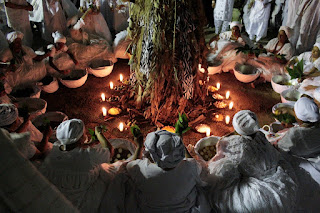The preservation of African traditional cultures through the diametrically opposing concepts of science and cultural tradition
For most of my life, I feel that people have been categorised into two categories. People who are interested in maths and science, and then there are people who are interested in art and music. Are you left brained or right brained? Do you support Western epistemic knowledge that is modern and based on empirical evidence and “rational” thought? Or do you support African epistemology that is more holistic, spiritistic and traditional? One thing that has always been certain is that science and the social sciences and technology and culture have always been positioned as two diametrically opposed conceptions. Every conception that is scientific and technological exists in a mutually exclusive space from what is traditional and cultural.
The summer that I turned 13 there was a drama like no other in my family. My 17-year-old boy cousin who grew up in Cape Town refused to go through the initiation process of Ulwaluko because he declared it an archaic, outdated, and patriarchal ceremony. The initiation process of Ulwaluko is a traditional circumcision and initiation ancient practice of the Xhosa people that is intended to prepare young males for the responsibilities of manhood. The initiates are called abakhwetha and a male who has not undergone initiation will forever be referred to as inkwenkwe (boy) regardless of his age and he will not be allowed to participate in any male activities such as tribal meetings.
As the family nucleus in the Eastern Cape was preparing for the initiation of the “modern boy” Ngcwengo, he made the most controversial decision in our family history by becoming the only male in the family to not go through initiation. Ironically enough, however, he did decide to get circumcised in the hospital because it is a “scientific fact” that circumcision significantly reduces the risk of contracting or spreading sexually transmitted diseases. His issue was not about circumcision, Ngcwengo simply refused to enter the “toxic patriarchal space of Xhosa initiation” because according to him Xhosa culture indoctrinates toxic ideas of manhood and masculinity onto impressionable young boys.
No one can be forced to do anything that they do not want to do, and so Ngcwengo did not go through initiation. However, because he refused to become umkhwetha and go through Ulwaluko, he is unfortunately still referred to as a boy to this day in the context of Xhosa culture.
I tell this story not to raise moral questions of who is right or wrong, but rather to highlight how a simple refusal to go through initiation unintentionally exposes the negative effects of the lack of knowledge and archive on African/Xhosa culture. It illustrates the sometimes-combative relationship between preserving African traditions and the emergence of Western epistemology in African culture. Ngcwengo like many other Africans has more faith in science, western knowledge, and Western conceptions of gender than in his own culture. Many Africans view African culture as primitive, patriarchal, sexist, unscientific and non-factual. The sad thing about this is that there are such few ways to disprove this untrue assumption due to the lack of written sources that could depict the rich histories of African culture, its understandings of gender and the role of women in its history.
Alice Fulton writes a beautiful poem about a love that keeps evading her. The idea of reconnecting or reaching this desired person is described as so impossible that it is only comparable to interacting with a “comet on its perihelion passage”. Chasing this person is comparable to the speed of a comet one it enters the Earth’s atmosphere and the speed of a star or an electron. It is very rare and quite strange at first to use a such a rational theme such as science and astronomy to metaphorically compare emotive and sometimes irrational themes such as longing and an ever-evading love. However, Alice Fulton manages to do this.
“No harder reaching you is understanding the sparking vacuum that flung me here”. The idea of finally reaching this evading figure is as hard to conceptualise as it is to understand the creation of life, which is the big bang. The big bang was a serendipitous moment in the universes' creation that happened fortuitously, and there is no explain why or how it just happened. Although this poem uses images of the universe, space, comets and stars, the underlying theme is wanting someone that you know you can never have. Whether platonic or romantic, the poem is a declaration of love and a longing for a reconciliation. What strikes me most about this poem is that science is not positioned in a diametrically opposed position to non-scientific themes of disillusionment and desire, they are used in perfect unison.The poem about meeting the universe halfway is an example of how science and the arts do not have to exist exclusively. They can essentially work in perfect unison to deepen each other’s concepts. Similarly, to how the completive culture of building sound systems in Jamaica was not only an ecosystem that created jobs, but the technology in Jamaica actually bore the culture of Jamaica. Without the need to build powerful amplifiers and giant speakers, the indigenous sound of Jamaica would never have been born.
These harmonious interactions between science and culture show me that I do not have to view modern science as a threat to African culture, tradition, and epistemology. There are probably elements of modernity that I can use as arguments for the preservation of African traditions, and that African traditional cultures do not have to be diametrically opposed to science and technology.




Comments
Post a Comment